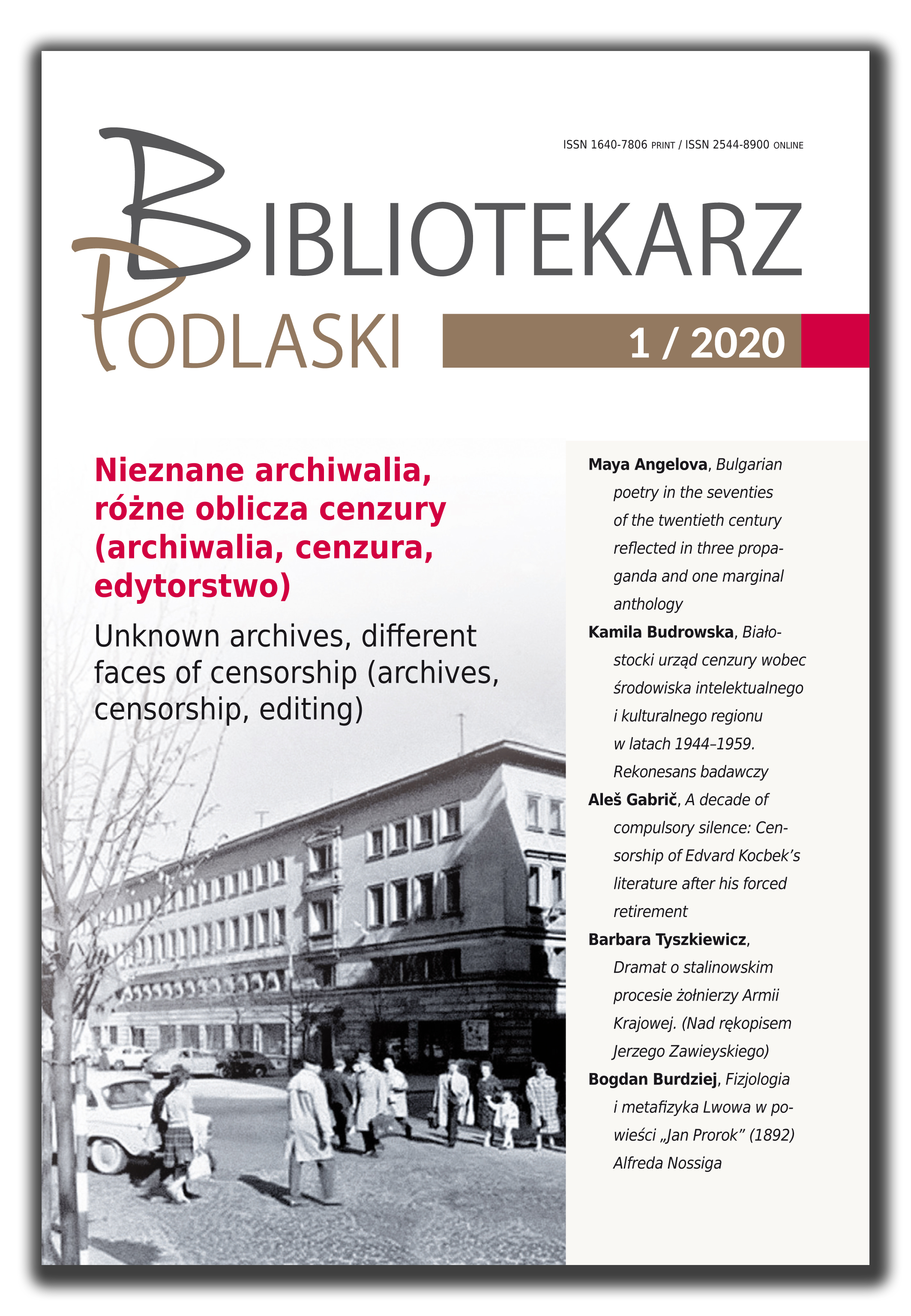Abstract
In the autumn of 1950 Jerzy Zawieyski began writing a drama about a lawsuit of soldiers of the Home Army which took place that day in the People’s Republic of Poland. He abandoned this work after he drew up a plan and finished two scenes of the first act. In the article, he considered the issues of this play and its historical, literary and bio- graphical backgrounds. A reflection on the unfinished drama translates into a description of mechanisms that inhibited development of Polish literature in the period of socialist realism’s offensive. The matters of censorship and self-censorship cross-refer to the writer who, after 1949, became a literary outsider significantly limited in his copyrights.
References
Ambroziewicz J., Namiotkiewicz W., Olszewski J., Na spotkanie ludziom z AK, „Po Prostu” 1956, nr 11, s. 3.
Andrzejewski J., Popiół i diament. Powieść, Warszawa 1948.
Andrzejewski J., Zaraz po wojnie („Odrodzenie” 1947, nr 3-22) (niedokończona wersja powieści Popiół i diament).
Bajer L., Literatura w długach, „Gazeta Robotnicza”, dodatek „Sprawy i Ludzie” 1956, nr 35 [właśc. 36], s. 3.
Budrowska K., Literatura i pisarze wobec cenzury PRL. 1948–1958, Białystok 2009.
Csató E., Walka o realizm socjalistyczny w polskim teatrze, „Myśl Współczesna” 1950, nr 10, s. 149.
Czeszko B., Pokolenie, Warszawa 1951.
Fijałkowska B., Polityka i twórcy. (1948–1959), Warszawa 1985.
Florczak Z., Reminiscencje i historia, „Nowa Kultura” 1956, nr 19.
Gomułka W., [Wypowiedź na ogólnokrajowej naradzie PPR w Warszawie na początku 1945 r.]. Cytat za: M. Wojtczak, Wielką i mniejszą literą, Warszawa 2014, s. 80.
Górski K., Rola pisarza katolickiego w dobie współczesnej, „Tygodnik Powszechny” 1946, nr 37/38, s. 1-2.
Habielski R., Przeszłość i pamięć historyczna w życiu kulturalnym PRL. Kilka uwag wstępnych, [w:] Polityka czy propaganda. PRL wobec historii, red.: P. Skibiński, T. Wiścicki. Warszawa 2009, s. 87-115.
Kloc A., Cenzura wobec tematu powstania warszawskiego w literaturze pięknej w latach 1956–1958, „Acta Universitatis Lodziensis. Folia Litteraria Polonica” 2013, nr 4, s. 207-228.
Kloc A., „Tylko krasnoludków nie ma, bo wyszły”. Cenzurowany obraz Armii Krajowej w poezji polskiej w latach 1956–1958, „Acta Universitatis Lodziensis. Folia Litteraria Polonica” 2013, nr 1, s. 71-88.
Przyczynek do sprawy AK, „Po Prostu” 1956, nr 13, s. 3 (blok wypowiedzi zawierający między innymi: Głos [Edmunda] Osmańczyka; Dlaczego i dziś jesteśmy akowcami, podpisany: „Akowiec”).
Sokorski W., Nowa literatura w procesie powstawania, „Odrodzenie” 1949, nr 5, s. 1-2.
Stomma S., Turowicz J., Katolicy w Polsce Ludowej, „Tygodnik Powszechny” 1950, nr 50, s. 3-4.
Synoradzka A., Andrzejewski, Kraków 1997.
Tyszkiewicz B., Arkadia i władza w komediowym i realnym świecie Jerzego Zawieyskiego, [w:] Obrazy władzy w literaturze, teatrze i filmie, pod red. S. Ligarskiego i M. Mazura, Warszawa 2015, s. 183-202.
Wojtczak M., Wokół Conrada. Problem AK, [w:] tegoż Wielką i mniejszą literą. Literatura i polityka w pierwszym ćwierćwieczu PRL, Warszawa 2014, s. 78-80.
Zabierowski S., W kręgu Conrada, Katowice 2008.
Zawieyski J., Brat Antygony, Izabelli i Bronisławowi Nyczom, „Tygodnik Powszechny” 1957, nr 1 s. 4-6, nr 2, s. 4.
Zawieyski J., Dzienniki, t. 1. Warszawa 2011. Zawieyski J., Lament Orestesa, „Znak” 1953, nr 1 (35), s. 42-70.
Zawieyski J., Niezwyciężony Herakles, „Tygodnik Powszechny” 1952, nr 35, s. 1-2, nr 36, s. 6-7.
Zawieyski J., Sokrates, „Tygodnik Powszechny” 1950, nr 26, s. 6-8, nr 40, s. 6-8, nr 44, s. 6-7.
Zawieyski J., Zagadnienie literatury katolickiej, „Tygodnik Powszechny” 1947, nr 23, s. 1, 3-4.
Żółkiewski S., Aktualne zagadnienia powojennej prozy polskiej, „Kuźnica” 1949, nr 4, s. 1–4, 8.
Materiały niepublikowane:
Główny Urząd Kontroli Prasy, Publikacji i Widowisk (Dokumentacja w Archiwum Akt Nowych w Warszawie), sygnatury: 170 a, s. 79; 421, t. 197/3, s. 35.
Zawieyski J., Fragmenty dramatu i notatki do tegoż dramatu (chyba niezrealizowanego), Biblioteka Ossolineum we Wrocławiu, sygn. 16125 II/2.
Zawieyski J., Listy do Stanisława Trębaczkiewicza [z lat 1947–1951], Biblioteka Ossolineum we Wrocławiu, sygnatura 16 453/II, wol. 1-3.
Articles published in the “gold open access” mode on the basis of a non-exclusive license agreement between the publisher and the author. Permitted use:
- the publication may be read and stored on any device,
- the publication may be cited (with obligatory reference to the author, the title of the text, as well as the full title, bibliographic address of the issue and page of the journal)
The editorial team of “Bibliotekarz Podlaski” implements an open access policy by publishing materials in the form of the so-called Gold Open Access. From volume 42 (issue 1/2019), the journal is available under the Creative Commons license (Attribution – ShareAlike: CC BY-SA).
The key declarations of the Open Access and Open Science movement, which we fully support, are available on the CEON Open Science website.
COPYRIGHT:
The editorial team of “Bibliotekarz Podlaski” implements an open access policy by publishing materials in the form of the so-called Gold Open Access. The journal is available under the Creative Commons license – Attribution – ShareAlike 4.0: International: CC BY-SA 4.0).
The key declarations of the Open Access and Open Science movement, which we fully support, are available on the CEON Open Science website.
“Bibliotekarz Podlaski” allows its readers to read, download, copy, distribute, print, search and link to the full content of articles. We enable full, immediate, unlimited (both in a territorial, temporal and technical sense) open access to all published content, in accordance with the principle that freely available research increases and accelerates the global development of science and the exchange of knowledge.
The editorial team of “Bibliotekarz Podlaski” encourages authors to place articles published in the journal in open repositories (after the review or the final version of the publisher), provided that a link to the journal’s website is provided.
The journal does not charge the authors any fees for accepting and publishing their texts.


